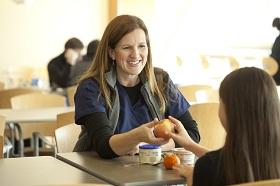Student distinction
Pediatric nurse conducts research to help tackle childhood obesity

Master's-degree student Christy Solorio researches healthy eating and feeding practices.
Editor's note: This story was first published in winter 2012. As of June 2013, Solorio is a M.S. - Leadership graduate from the School of Nursing. As of fall 2013, she continues her studies at the Betty Irene Moore School of Nursing within the Nursing Science and Health-Care Leadership Doctor of Philosophy Program.
As a pediatric nurse, Christy Solorio witnesses the effects of the obesity crisis among youth on a daily basis. Now, through her study in the Nursing Science and Health-Care Leadership Master’s Degree Program at the Betty Irene Moore School of Nursing, Solorio conducts research that could help address some of the causes of the obesity epidemic.
Solorio, who has a bachelor’s degree in psychology, is interested in how motivation influences health behaviors. Specifically, Solorio is keen to understand what motivates parents to implement certain practices related to feeding their children. Solorio’s research examines the association between food insecurity—doubt about whether one has access to sufficient, safe food—and parents’ feeding practices with their young children.
“I am particularly interested in this research because it looks at feeding practices with young children, and the earlier you intervene in the way children are fed, the more of an impact you can have,” she said.
From her 10-plus years of clinical experience, Solorio is very familiar with the chronic health problems obesity can cause, and it is deeply distressing to her to see individuals start out on an unhealthy path so early in life.
“I see the pain that obesity causes in children,” Solorio said. “They’re not able to do the things that kids should be doing.”
Childhood obesity rates are “going through the roof,” as Solorio describes it—along with conditions for which obesity is a risk factor, such as Type II diabetes, high blood pressure and heart disease. Solorio is passionate about addressing this health crisis, especially among populations that are at increased risk for obesity, such as low-income minority groups.
For her master’s-thesis research, Solorio collaborates with an interdisciplinary team of UC Davis researchers who are conducting a multiyear study to help Mexican-heritage children between the ages of 3 and 8 in who live in California’s Central Valley maintain healthy weights.
The Niños Sanos, Familia Sana (Healthy Children, Healthy Family) study, led by Adela de la Torre—a professor of Chicana/o studies and director of the Center for Transnational Health at UC Davis—provides multifaceted nutrition, physical activity, economic and community-based art interventions to Mexican-heritage children and families in two low-income Central Valley towns. This large, multiyear study aims to determine which interventions are most effective in helping kids maintain healthy weights. The town of Firebaugh will receive the more intensive intervention. The town of San Joaquin will serve as the control group; residents there will receive some of the health-related interventions during the study, and will receive the other interventions after the research is completed. The study utilizes community-based participatory research methods, which means that the community is deeply involved in each phase of the project. In 2009-10, Mexican-American children were 1.6 times more likely to be overweight as non-Hispanic white children, according to the U.S. Department of Health and Human Services’ Office of Minority Health.
Utilizing data collected through this study, Solorio is analyzing the connection between childhood obesity and such familiar parental feeding practices as the requirement that children “clean their plate.” She hopes to gain a better understanding of how a family’s food insecurity influences how parents feed their children. She is also examining the association between parents’ perceptions of their child’s weight, health and appetite, and how those perceptions impact parental feeding practices.
To analyze these associations, Solorio is evaluating measurements such as body-mass index, family responses to a health survey and family responses to a U.S. Department of Agriculture Food Security Assessment.
The health-promoting interventions in the interdisciplinary UC Davis study begin this year and will last for three years, followed by a year of measurement and follow-up. Solorio hopes her research may be useful as these interventions roll out.
“I hope my research can inform future interventions to help curb childhood obesity in the Central Valley,” she said.
Solorio’s education is supported in part through a Hersted Fund for Pediatric Nursing scholarship.





